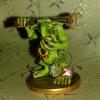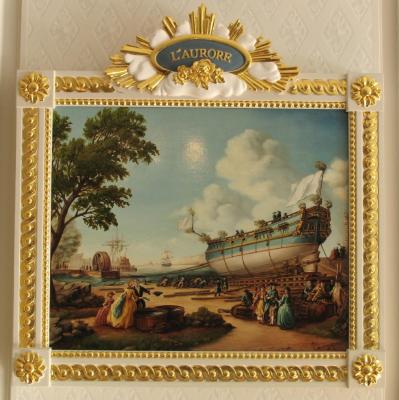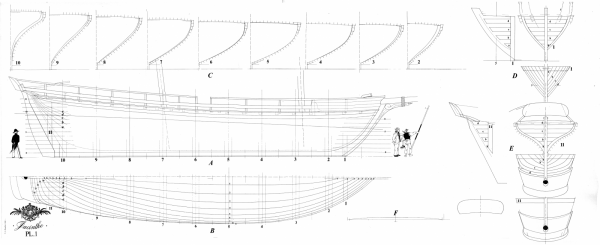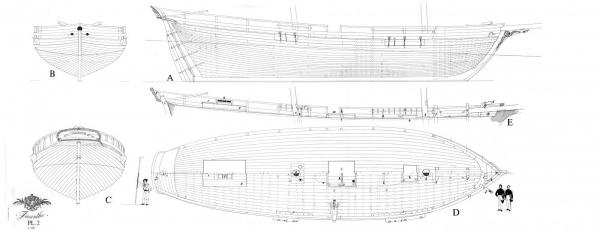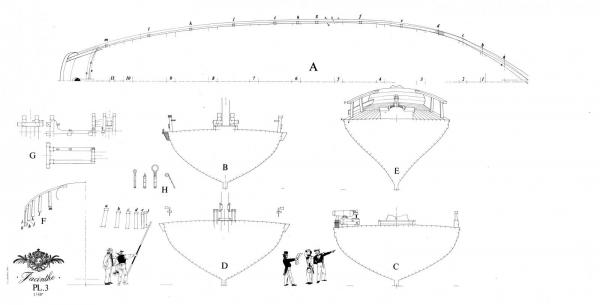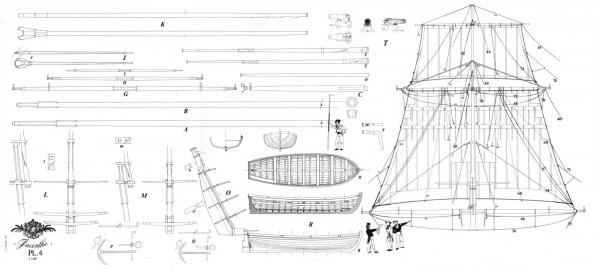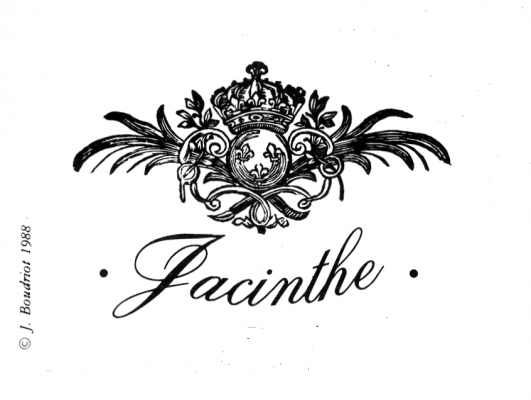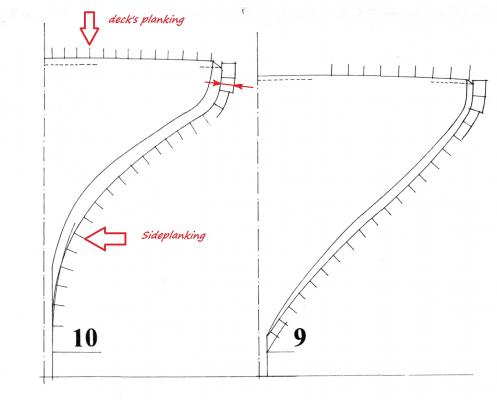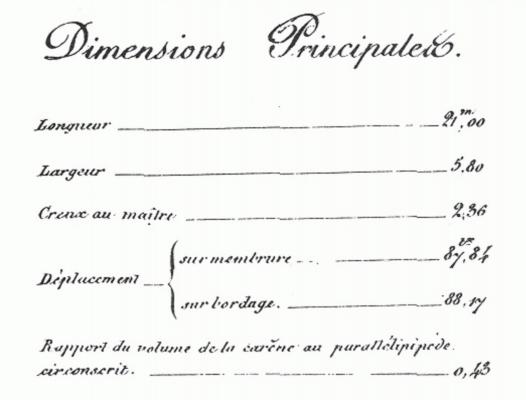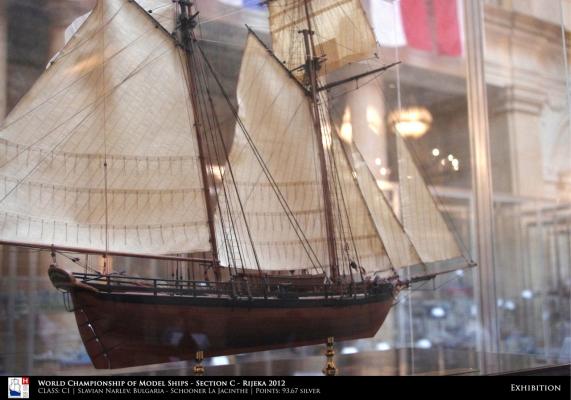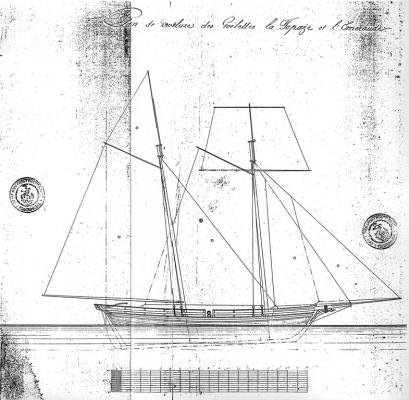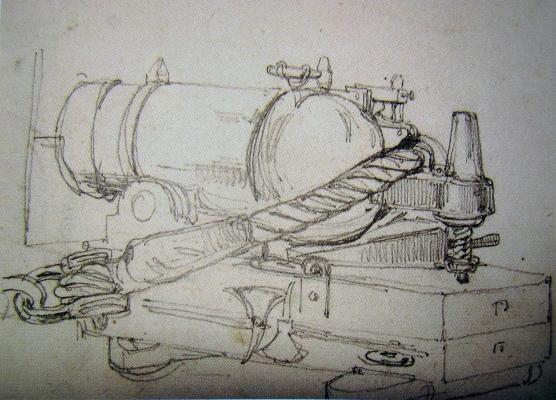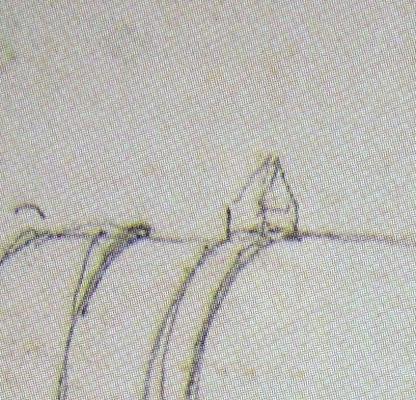-
Posts
162 -
Joined
-
Last visited
Content Type
Profiles
Forums
Gallery
Events
Everything posted by Small Stuff
-
The most important think is -so I have been told - getting so fit in my plans sheets that I'm able to walk over the deck in my mind. And being able to make a perspectiv drawing of my best love - best moring in the water. I think about the colours - the lower parts black and the upperparts in the classical french greenish blue colour like in the painting of "L'Aurore". Do you think it is realistic - for a schooner of the french restauration navy?
-
What a wonderfull built! Amazing solutions and instructive approaches. Thanks a lot for a view over your shoulder in this phantasic workshop... 20 times larger than my "hole under the high-sleeper-bed. But now I know I why I decided those days to built only small stuff...
- 728 replies
-
- le fleuron
- 64 gun
-
(and 1 more)
Tagged with:
-
Par l'Ingénieur De La Morandière 1823 HISTORIQUE DES GOËLETTES & MONOGRAPHIE METHODE DE CONSTRUCTION DU MODELE this is the original title on the books cover but I'm working with my "working edition" copied from the english libary edition - because I can't spreak french and only guess some vocabulary by my rest of latin from school. Some months ago I borrowed the english edition from the libary and figured out there are more than five schooners awaiting the reader inside. I decided to buy the book because it is a very economical way to built a hand full of ships by one book - due to the fact that I'm not wealthy. And so I buyed the french edition pre-owned on the antique market with all the five plan sheets inside for all that I cannot speak french at all! So I payed again for the interlibary loan to get english-languaged copy again - copying it to be able to read it at all. I searched out three possible model ships for myself to get more difficult projects "to keep the challange alive" - going foreward step by step. So I followed the Monfeld's way of growng complexity in the chose of the paragon. I wrote to the Ancre publishers to get some more details about the sweaps for the boats and the oars for the aviso - because I decided to build her in a clam towed by boats. This type of model will give the possibility to me to show her full rigging of all sails and studdingsails set in an spiral order (after MacGregor "The square rigged sailing ships"). The spiral is the trial to catch any wind from any direction. And to use this moment also to give an idea of the size of the schooner to the viewer by using 1/48 figures at the oars in boat and on the deck. (I made mility modelbuilding for many years and so I'm used to alter figures to get them to fit to the situation they are placed in.) "La Jacinthe" is an aviso schooner built for the use in the colonies. The small armarment of two 12 pounder carronades shows clearly the were not built wor the battle line. The were built and used as dispatch vessels for collecting information and having an eye on the trade traffic. The schooner belonged to the Anemone-Class and the ships were in duty till the 1860th - some of them were altered and got an encloses bulkwalk and a one part gun lid from the hulls side up to the middle of the port. A problem I'm dealing with in my article about the "La Munite" in her appearence of 1833 ( http://modelshipworld.com/index.php?/topic/4810-la-jacinthe-building-a-variation-further-sources/ ). A picture added below. The shistership "La Topaze" doesn't had a topgallant sail and yard. She may have used the two triangeled sails instead. The dimensions are given in the original enlisting from the drawing below. A very good model was to see on the woldchampionship in Rijeka 2012 winning a C1 silver medal by the skilled builder Slavian Narlev from Bulgaria. So I'm going to tell something about her and my thoughts about my first scratch project - I'm going to catch as much information before my start as possible. Here are the plans sheets - all are scaled to 1/48! The very best point for the very beginning greenhorn like me is the planking is shown plank for plank in the sections drawing. Where to glue to the formers and how thick the pear has to be. Best for me may be to put a first planking of solftwood (lime/linden) on bulkheads and than to sand till the blood is coming out under the nails... to be able to add the second pearplanking on a smooth surface. So I start now to collect some information, ideas and perhaps warnuings from all of you - long time before starting the building. So I'll have a look towards my copies and asks some of the typical greenhorn questions.
-
Dear finds finding a drawing of a carronade I Can add some interstin features here for everybody how beliefs in targeting by special equipment as an intersind addition to a model ship: Can anybody add intormation about the "diopter sight" and the "cap lock mechanism" to us? Johann's article (picture No4) has some information - http://modelshipworld.com/index.php?/topic/1029-la-cr%C3%A9ole-by-archjofo-scale-148-french-corvette-of-1827-scratch-build/%C2'> - perhaps he can help!
- 1 reply
-
- iron sight
- diopter sight
-
(and 1 more)
Tagged with:
-
THy Bob, that looks as an interseting project I'm going to board, too.
- 420 replies
-
Glennard - that looks fine! You're very fast. Are you going to imitate the deck's nails next?
- 19 replies
-
- scottish maid
- artesania latina
-
(and 1 more)
Tagged with:
-
Daear Rob, from my work on 1/700 ships in boxes I learned the hard lesson that gypsum is going to give its water into the air for/after very long years! So this "water" of a closed bottle or showcase will show "dew" inside. And later you'll get mold or serpula fungus! But the model's wood will have "labored" long time before you can see these or other signs. This is why ships are bottled in coloured window putty. I like your sea in action and authentic colours very much. And so I want to give you my bitter know-how - before you enclose your showbox -due to the wonderful work you are doing. HTH.
-
What an intresting Brigg, Richard! And with an exiting history! Thanks for sharing. I'll follow!
- 55 replies
-
- mercury
- victory models
-
(and 1 more)
Tagged with:
-
Hy Pete, 1/24 - that's really big! Thanks for your answer - I was irritated because there is the word SMALL in the title - but it is a small boat in a large scale ... that sounds to be an intresting idea! Aren't you affraid of so less moulds and fixingpoints for the planks? Fine Work you've done! Thanks for sharing.
- 153 replies
-
- musongus bay
- sloop
-
(and 1 more)
Tagged with:
-
Hello Pete, I'm following your step from the kit to scratch with great interest. H.I.Chapelle drawing is a first class source and I like his book about small sailing crafts very much. I'm very interested in the working rudder... but if the rudder is "alife" (instead of light inside) you can make her RC? So I'm asking for the scale I guess something like 1/96 or 1/64 - am I right?
- 153 replies
-
- musongus bay
- sloop
-
(and 1 more)
Tagged with:
-
Old Collingwood - great work you do! Perhaps these pictures from the NMM 1/48 original model of 1720 may help: http://upload.wikimedia.org/wikipedia/commons/4/40/Sixth_rate_ship_model_3.jpg http://upload.wikimedia.org/wikipedia/commons/c/c8/Sixth_rate_ship_model_2.jpg The systematic number in the NMM is SLR 0411 and you can find good pictures in Robert Gardiner's The Sailing Figat A History In Shipmopdels, too. I found a drawing about Lyme in Robert Gardiner's The First Frigats Nine-Pounder And Twelve-Pounder Frigates, 1748-1815. You have got this book in your shelf? (Or you may like to use Chapman's well known Plate LV, No.10.. .http://www.sjohistoriska.se/ImageVaultFiles/id_3085/cf_1803/55.JPG ) Edit: http://www.shipwreckworld.com/media/article/images/2008/06/13/118-original-hmsontarioadmiraltydrawing02.jpg Is the AotS book helpful to you also you built Lyme? HTH, yours Stan
- 455 replies
-
- slightly modified
- greyhound
-
(and 1 more)
Tagged with:
-
Daniel, you did the pictures by an electron microscope, didn't you??? Wonderful work far away from my skills! Beside producing empty bottles
- 94 replies
-
1/96 - what a miniscule work you do - that's great to "sea" . Thanks a lot for sharing this impressions.
- 89 replies
-
- scottish maid
- clipper
-
(and 2 more)
Tagged with:
-
Hello Ray - thanks for this interesting thread! That looks very intersting for my specially - I mull over her as a next kit, too. I found the drawing in my German copy of the "Search for Speed under Sail" from MacGregor and fall in love to her sideview quiet. Oh yes - but I'm affaid of her rigging! This looks so complicated and the picture of the kit in the web looks also not so easy! So I'll follow your built's progresses with intrest.
About us
Modelshipworld - Advancing Ship Modeling through Research
SSL Secured
Your security is important for us so this Website is SSL-Secured
NRG Mailing Address
Nautical Research Guild
237 South Lincoln Street
Westmont IL, 60559-1917
Model Ship World ® and the MSW logo are Registered Trademarks, and belong to the Nautical Research Guild (United States Patent and Trademark Office: No. 6,929,264 & No. 6,929,274, registered Dec. 20, 2022)
Helpful Links
About the NRG
If you enjoy building ship models that are historically accurate as well as beautiful, then The Nautical Research Guild (NRG) is just right for you.
The Guild is a non-profit educational organization whose mission is to “Advance Ship Modeling Through Research”. We provide support to our members in their efforts to raise the quality of their model ships.
The Nautical Research Guild has published our world-renowned quarterly magazine, The Nautical Research Journal, since 1955. The pages of the Journal are full of articles by accomplished ship modelers who show you how they create those exquisite details on their models, and by maritime historians who show you the correct details to build. The Journal is available in both print and digital editions. Go to the NRG web site (www.thenrg.org) to download a complimentary digital copy of the Journal. The NRG also publishes plan sets, books and compilations of back issues of the Journal and the former Ships in Scale and Model Ship Builder magazines.


